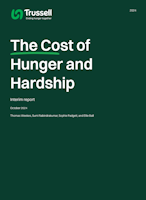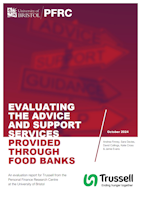 In her first post, Sarah Fullick introduced Trussell, explains why data is so important to them and introduces Trussell’s mission beyond foodbanks.
In her first post, Sarah Fullick introduced Trussell, explains why data is so important to them and introduces Trussell’s mission beyond foodbanks.
In this second post, she explores how research brings Trussell’s data to life, how Trussell uses data to drive change and looks further ahead.
The power of qualitative research: Trussell’s data brought to life
Quantitative data gives us the scale of the problem, but qualitative research provides context and depth – while bringing the quantitative data to life. Through interviews, focus groups, surveys, case studies and participatory workshops, we hear directly from people who need to turn to food banks to survive – and about their lived experiences.
These insights are not just anecdotes; they are powerful pieces of evidence that highlight the human impact of hunger and hardship in the UK.
Our qualitative data provides a rich context and deeper understanding that complements our quantitative data, helping us communicate the urgency of the issue to policymakers, the media, and the public, fostering empathy and understanding.
Participatory research is embedded in all we do to ensure that our policy recommendations are informed and shaped by lived experience.
For example, we’ve gathered evidence from individuals who have been pushed to the brink due to unexpected life events, such as a sudden job loss or a health emergency, which left them without enough money to live on.
These insights underscore the fact that hunger and hardship in the UK is a systemic issue that requires systemic solutions, and has helped shape our recommendations for policies to end the need for food banks.

Additionally, our participatory approaches and qualitative research shed light on other critical areas of support services.
For instance, our Money Matters advice and support services have been pivotal in helping individuals maximise their income and manage debt.
These services offer a combination of income maximisation advice, debt management, and referrals to other support services. The holistic approach of these services has demonstrated promising outcomes, such as alleviating financial hardship and reducing the reliance on emergency food.
By understanding how people experience support services and their preferences, we can develop ‘fit for purpose’ solutions to effectively address hunger and hardship.
How Trussell uses data to drive change
Our research is not just about understanding the problem – it’s about solving it. We use the data we collect to advocate for evidence-informed policy changes that address the root causes of hunger and hardship in a sustainable and equitable way.
For instance, our findings have informed policy recommendations, including:
- Hunger in the UK | Trussell – What are the policy solutions?
- A more resilient future: Rebuilding discretionary crisis support in England | Trussell
- The Cost of Hunger and Hardship | Trussell
We have also supported campaigns for stronger social security systems, fairer wages and more secure jobs, and more affordable housing.
By presenting robust evidence to policymakers, we can make the case for long-term solutions that prevent people from needing food banks in the first place. Data also plays a crucial role in keeping the issue of hunger and hardship salient in the public consciousness. Through reports, media engagement, and public awareness campaigns, we use our research to highlight the ongoing need for food banks, as well as the structural inequalities that drive their use.
By increasing knowledge and empathy, we can build a movement of people committed to ending hunger in the UK.
Our Cost of Hunger and Hardship report is the first of two reports analysing the personal, social, and economic impacts of hunger in the UK.
 This interim report, created in collaboration with WPI Economics, defines the scale of hunger and hardship, identifies those most affected, and assesses policy impacts.
This interim report, created in collaboration with WPI Economics, defines the scale of hunger and hardship, identifies those most affected, and assesses policy impacts.
It reveals a significant rise in the numbers of people facing this over the past 20 years, with certain groups, such as children and disabled families, disproportionately affected, and the projected continuation of this rise without decisive policy action.
Using policy modelling approaches, the report highlights policy tools – especially social security investment – that can reduce hunger and hardship, urging immediate government action to build a better future.
Our money matters advice and support services evaluation, conducted by the University of Bristol, assessed the impact of advice and support services provided by food banks.
 It found that these services significantly improved financial stability by helping people maximise income and reduce debt. However, the evaluation also highlighted that systemic issues like high living costs and insufficient social security benefits still pose challenges.
It found that these services significantly improved financial stability by helping people maximise income and reduce debt. However, the evaluation also highlighted that systemic issues like high living costs and insufficient social security benefits still pose challenges.
The findings suggest that while these services are beneficial, policy changes are needed to address the root causes of financial hardship and ensure long-term solutions.
Looking ahead
The need for food banks is a symptom of a broken system, and our research is a vital step towards fixing it.
By combining quantitative and qualitative approaches, we can build a comprehensive understanding of hunger in the UK – and use this knowledge to influence policy, raise awareness, and inspire action.
We can end the need for food banks, but we can’t do it alone. It will take collective effort, political will, and a commitment to justice and compassion. With data as our guide, we are confident that change is possible.
At Trussell, we believe in a UK where everyone can afford the essentials. And with every report, every statistic, and every story, we push for change now and for the future.
Read more about Trussell’s work to end hunger and hardship in the UK.
About the Author
Sarah Fullick is Head of Impact and Evidence at Trussell.
Comment or question about this blog post?
Please email us!
